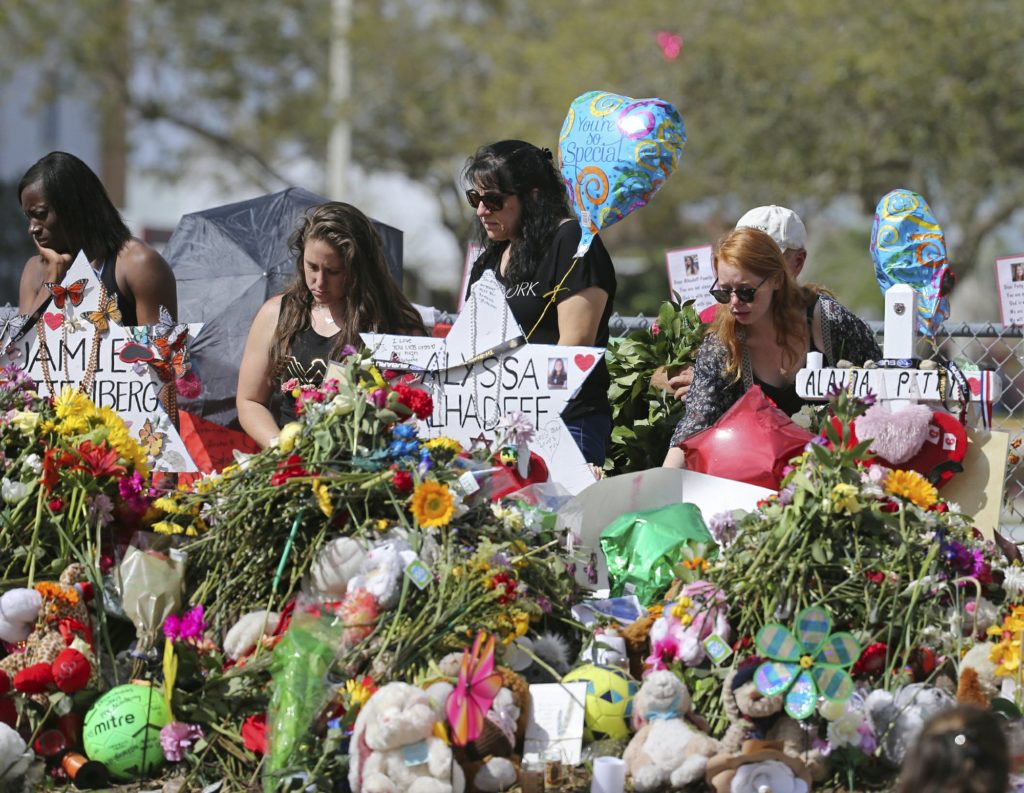
PARKLAND, Fla. (AP) — Days after the suicides of two student survivors of the Parkland school shooting, parents and teachers packed a town hall Wednesday night, anxiously wondering out loud how to get students to seek therapy as many have been unwilling — despite a barrage of offerings since the 2018 massacre.
On Wednesday night, anxious parents in the standing-room only crowd spoke of fears and frustration in trying to get their children help after the Valentine’s Day massacre that February, which killed 17 people.
Lissette Rozenblat recalled how her 16-year-old daughter was in the freshman building the gunman attacked.
Other parents also said they are left feeling helpless because of the difficulty of forcing kids to get help they don’t want.
“My son doesn’t want to discuss it at all either,” said Joe Safonte, whose 17-year-old narrowly missed an encounter with the gunman.
His son stopped therapy after six months, saying it wasn’t helping anymore, according to Safonte. But just last week, the father noted, his son was terrified when an alarm went off in their hotel room.
“Maybe it’s time to go back,” he said.
The first Parkland suicide took place March 16. Cara Aiello told WFOR-TV her 18-year-old daughter Sydney had suffered from survivor’s guilt — her friend, Meadow Pollack, died in the attack. Coral Springs police Officer Tyler Reik confirmed Monday that a Stoneman Douglas sophomore apparently killed himself Saturday, but autopsy results were pending. The boy’s name was not immediately released.
A local nonprofit had planned to open a teen wellness center near Marjory Stoneman Douglas High School on April 30, offering free activities such as karaoke night, yoga, kickboxing and acupuncture for students who weren’t interested in talking to a therapist. A wellness center, Eagle’s Haven, even opened weeks ahead of schedule Monday to address emergency needs of students and their families.
Some students say they feel re-traumatized talking about the Parkland shooting. Some only want to talk to friends who were there and understand what it’s like. Still others perceive a stigma around seeking help.
Shortly after the shooting, leaders in the affluent community quickly came together to offer an array of services, many free, including in-home counseling, therapy dogs and trauma techniques.
“Even though so many services have been available, it’s been difficult to understand through the clutter of messaging …. there’s so many options that it’s hard to understand where to go,” said Cindy Arenberg Seltzer, president of the Children’s Services Council of Broward County.
She moderated the standing room only town hall Wednesday, describing how calls to a 211 helpline had been flat after the shooting.
The number of calls went up, however, after the recent suicides.
Said Seltzer, “finally the message is breaking through.”
The recent apparent suicides of the two Parkland students and Jeremy Richman, the father of Sandy Hook victim who killed himself Monday, made national headlines, prompting fears of suicide or contagion clusters. Richman’s daughter Avielle was one of 20 first-graders and six staff members fatally shot at the Connecticut elementary school six years ago.
The Florida House held a moment of silence for all three Wednesday, their names read out as part of a tribute. Gov. Ron DeSantis scheduled a last minute listening session on mental health Thursday.
Parkland leaders are working closely with those in Columbine, Colorado, and Newtown, Connecticut, and noted a spike in Sandy Hook first responders and survivors seeking therapy and other services — some for the first time — at the five-year anniversary of the attack. Experts are working to debunk the myth that time alone will heal traumas.
“The trauma will still be there, the anxiety, the flashbacks,” Franco said. “People kind of measure those anniversaries and say, ‘OK, a year from now I’ll feel better,’ so the first anniversary comes and you’re not feeling better, so you’re feeling like it won’t go away. … There are therapeutic approaches that can really help you heal that. You don’t have to live with that.”
___
Editor’s note: The National Suicide Prevention Lifeline can be reached at 800-273-8255. The Crisis Text Line provides free, 24/7 crisis support by text. Text 741741 to be connected to a trained counselor. Students from Broward County schools can text FL to 741741.








